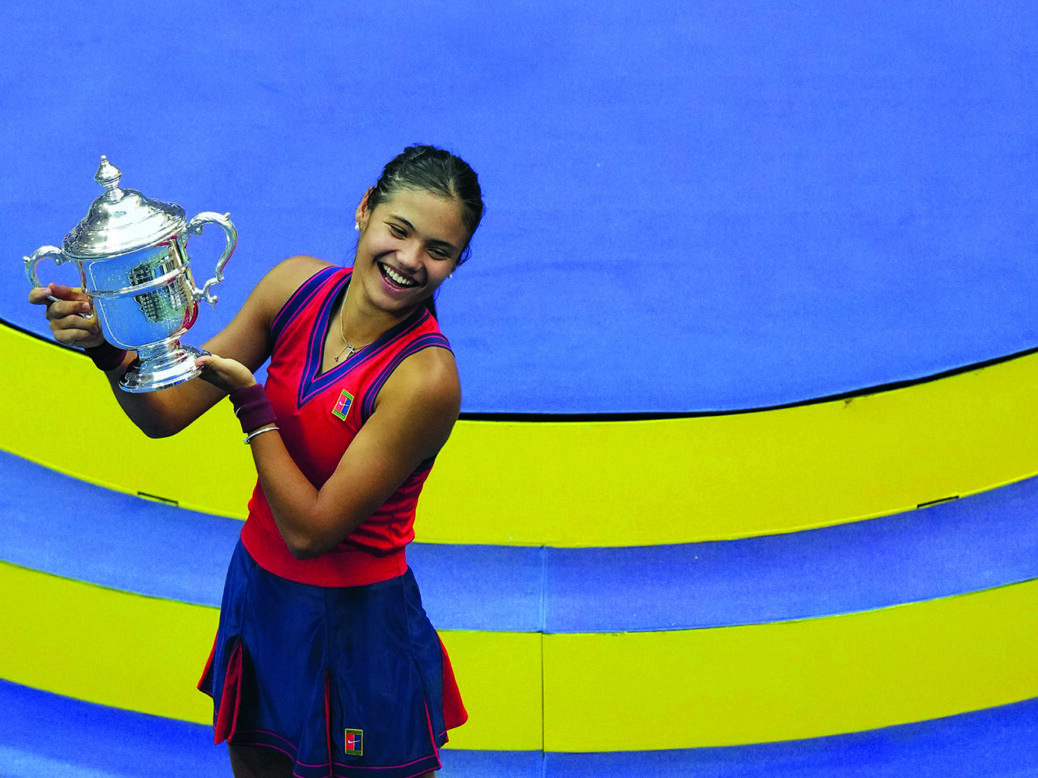
In the history of tennis, 126 women have won a Grand Slam tournament. Thirty-eight of them have done so without dropping a set. Twenty-eight were teenagers at the time of their first win. Twenty-one were British, although most of those date from an era when women still routinely played in wide-brimmed hats and corsets. Nine were unseeded. One had to come through qualifying simply to reach the tournament itself. This should offer at least a flavour of why Emma Raducanu’s victory at the US Open on 11 September is being hailed as one of the most unlikely triumphs in the history of the sport.
But, of course, there’s more to it than that. Not until a couple of years ago did Raducanu even settle on tennis as a career. This was only her second major tournament, after a stirring run to the fourth round at Wimbledon earlier this summer. Remarkably, she is yet to win a match on the main women’s tour, play on clay, or play a three-set match at senior level. And so really the only way we can begin to process Raducanu’s victory is to be a little stunned and amazed by it; to realise that for all the rationales being imposed upon it in retrospect, it still doesn’t make much sense.
Raducanu is 18, a skilful player but nobody’s idea of a power hitter or defensive mastermind. She is grounded, well-rounded and mentally strong. Since Wimbledon, where she withdrew mid-match due to breathing difficulties, she has worked hard on her fitness and conditioning. But we knew all of this a month ago, and yet not one person alive – least of all Raducanu herself, who had booked herself on to the first flight home from New York after qualifying – saw this coming.
[See also: Athletes like Simone Biles are not weak – they are pioneers for a new understanding of mental illness]
How did it happen? In part, she benefited from circumstances. She was scheduled to meet the world number one Ashleigh Barty in round four, the world number four Karolina Pliskova in the semi-finals, the big-hitting world number two Aryna Sabalenka in the final. Instead, all were unexpectedly beaten before she could face them, giving her a favourable run against opponents that suited her high-tempo rallying style. The 11th seed Belinda Bencic, whom Raducanu beat in the quarter-finals, was the highest-ranked player she faced all tournament.
This, in turn, is a reflection of the unprecedented fluidity in the women’s game: a broad, varied base of talent without a single outstanding dominant player. The past nine Grand Slams have produced eight different winners. At various points in the past few years Jelena Ostapenko, Naomi Osaka, Bianca Andreescu, Sofia Kenin and Iga Swiatek have all been anointed as the next big thing in women’s tennis. And they were, until the next came along. None of this, of course, has been of the remotest interest to large parts of the British media, which in its lavish feting of Raducanu has managed to inflate a rather lovely underdog story into a kind of surreal super-forecasting exercise, predicting billion-dollar fortunes and multiple Grand Slam successes. Of course, the outlandish predictions of billion-dollar fortunes and multiple Grand Slam successes may yet come to pass. But it’s important to remember that all this is still fleeting and fresh, the sample size still minuscule, the subject essentially still a teenager trying to establish her place in the world.
Part of the reason so much hope has been invested in Raducanu, you feel, is the state of tennis itself, a sport desperately searching for new faces, new narratives, new rivalries, new blood. Men’s tennis has spent more than a decade in the cloying grip of Roger Federer, Rafael Nadal, Novak Djokovic and their increasingly deranged online fandoms. British tennis has spent almost as long fretting about the inevitable decline of Andy Murray, and none of Britain’s other promising female players – Johanna Konta, Laura Robson, Heather Watson – has really threatened to fill the void.
[See also: How the Hundred has changed cricket]
And so into this prison of expectation and longing steps Raducanu, who seems not to care a jot for external pressure; who unlike many 18-year-old athletes actually plays and talks like she’s 18. It’s hard to overstate just how much tennis needs this right now, after more than a year of empty stadiums and sterile bubbles and stale storylines; of exhausted, unhappy players burned out by the endless treadmill of nasal swabs and social media abuse and business hotels.
Like many of the emerging torch-bearers of the younger generation – Spain’s Carlos Alcaraz, Italy’s Jannik Sinner, Canada’s Leylah Fernandez – Emma Raducanu still feels pure and vital and relatively untainted by any of this. She is yet to be ground down by tour life or tabloid exposés or internet trolls. She has not been co-opted into the culture wars. She has not been chased down the street by photographers. She’s not had a bad run of form, been questioned about why she’s not playing as well as she was. She’s barely even lost at all. It’s possible to feel exhilarated as well as sad about this. “This is the last time she will ever play totally without expectation,” the former British number one Andrew Castle said. This is what made her winning moment so beautiful, so perfect, so fragile, so unrepeatable. Above all, you hope she enjoyed it.
[See also: First we canonised Emma Raducanu – then we hounded her off the tennis court]
This article appears in the 15 Sep 2021 issue of the New Statesman, The Fateful Chancellor





